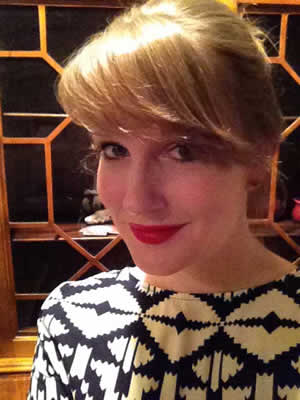Alumna returns for poetry reading
Corey Van Landingham BA ’08, a current Stegner fellow at Stanford University, captured the ears of students, professors, and friends at the Frank Manor House in February.
Open gallery

by Kaiya Gordon ’15
Corey Van Landingham BA ’08, a current Stegner fellow at Stanford University, captured the ears of students, professors, and friends at the Frank Manor House on in February. She read from her debut book, Antidote, winner of the Ohio State University Press/The Journal Award in poetry. Described as “unflinching, urgent, luminous work,” by Associate Professor of English Mary Szybist, the book grapples with Van Landingham’s grief over the death of her father and a failed engagement.
Assistant Professor of English and Director of Academic Advising Jerry Harp introduced the poet by mentioning that they had arrived at Lewis & Clark together: Van Landingham took a history of the lyric class in her first semester, which was the first class Harp taught at the college. That sense of history pervaded the reading, as Van Landingham discussed influences and literary traditions.
One overarching influence at Lewis & Clark is the late William Stafford, former professor at the college and U.S. Poet Laureate. Van Landingham—in preparation for Stafford’s centennial celebration—worked in the Stafford archives, viewing his correspondence with creative greats like Martin Bell and Ted Kooser.
“It was nice to see what history I was coming from,” said Van Landingham of Stafford. “As a contemporary poet, what I’ve learned from Stafford—and what I mourn in some way—is his understatement. I don’t always want to be told what I need from a poem.”
Stafford, hailed for his sharp and simple language, is not the only poet from whom Van Landingham has taken cues. Van Landingham opened her reading with Sylvia Plath’s “Epitath for Fire and Flower” to honor the anniversary of the great poet’s death. Other influences discussed were Adrienne Rich, Sappho, Shakespeare, and Chris Issak: her poem, “This World Is Only Going to Break Your Heart,” steals its title from a line of Isaak’s song “Wicked Game,” a song Van Landingham called a “jukebox favorite.”
After graduating from Lewis & Clark, she took a year off before completing an MFA at Purdue University. It was at Purdue that much of Antidote was written. Van Landingham stressed how important the MFA program was for her, saying that “it was the most important thing to do… it was time to write.”
In fact, time to write was incredibly fruitful for Van Landingham, as Antidote was written in only one year.
“The poems did come fairly quickly,” she revealed. “There was a rush to them.”
The poems themselves are otherworldly. Van Landingham herself describes the book as “surreal,” but also divulged that the writing process “ended up being a method in which I could approach grief. [In Antidote] there had to be some sort of continuous world… there had to be a layer of grief under each poem.”
Her reading was steeped in that layer of grief. Written in a variety of poetic structures, Antidote wouldn’t seem to lend itself to being read aloud, but Van Landingham’s obvious comfort in front of the audience and concentration on the characters that infiltrate her poems made for an intimate reading.
The poet seemed most settled while sharing personal anecdotes and stories. One striking moment among these was the way she ushered in her poem “Confessional” by recalling a time that her father lit their garage on fire with a discarded cigarette.
And Van Landingham is not yet done with sharing her work. She closed the reading with three new poems, which all ruminated on the contemporary subject of drone aircraft. The new poems—at once frightening and comforting, human and surreal—indicate a new focus for Van Landingham without sacrificing the strangeness of her debut.
But Van Landingham is not interested in being explicitly traditional: “I say love so much and I have so many birds and trees,” she said. “I’m interested in writing about things you aren’t supposed to.”
A version of this article originally appeared in Wordsworth, the English department newsletter.
More Newsroom Stories
Public Relations is located in McAfee on the Undergraduate Campus.
MSC: 19
email public@lclark.edu
voice 503-768-7970
Public Relations
Lewis & Clark
615 S. Palatine Hill Road MSC 19
Portland OR 97219

